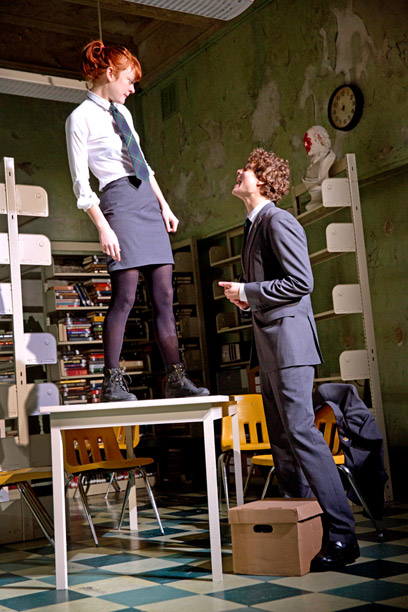

British playwright Simon Stephens’s adaptation of Mark Haddon's novel, “The Curious Incident of the Dog in the Night-Time,” is currently a big hit on Broadway. He will undoubtedly find additional favor with this gripping, but also terrifying, portrait of British teenagers in peril inspired by his own experiences as a teacher.
The seventeen year olds preparing for their A level exams we meet are financially privileged. However, they are neither emotionally mature nor brave enough to either handle or consider seriously the sign-posts that one of their pack is seriously skewed, if not downright demented.
It's probably easier to empathize with the troubled, insecure and alienated teenagers who've inhabited other teens-in-transition plays. The comically crude high school musical Grease comes to mind as does Alan Bennett's more recent brilliant study of student angst in preparation for exams, The History Boys. The granddaddy of them all Frank Wedekind's vintage classic of sexual awakening, Spring Awakening.
Still, given very real instances of bullying and violence, attention must be paid to this grimmer, more violence-instigating play. The space that Stephens has secured for these teenagers is the grungy-looking, mainly unused library (the work of designer Mark Wendland) of the sixth form of a fee-paying grammar school in Stockport in the U.K.
The large grey and dreary room with a few desks and chairs with exposed radiators is a depressing sight. It's made more so with messily stacked books on shelves that suggest it is definitely off the beaten path for a monitor or teacher. Except in two short final scenes, adults provide no buffer for what most people would consider as the students' unacceptable behavior.
The play's many short scenes are given a brisk staccato-like pace by director Trip Cullman, who also cleverly keeps an edgy, anything-can-happen-at-any-moment tension going. His excellent cast splendidly carries the weight of a gritty script that makes no apology for defining the characters somewhat stereotypically. This, however, doesn't get in the way of them being uniquely individualized.
The shrill, piercing sound of a buzzer is an indication that a class is over and with it comes a brief blast of deafening rock music (e.g., "Kerosene" by Big Black and other heavy metal songs), as the signal for a brief, nightmarish ballet performed in hyper-speed by the students. Wearing grotesque masks, they vent their repressed feelings and sexual desires in a series of living tableaux. These preludes segue into the just-as-scary routine encounters they regularly have with each other.
The daily doses of bullying, harassing, assaulting, insulting, and humiliating mainly stem from the need of the class's agitating tormentor-in-chief Bennett (Will Pullen) to assert his mastery and control of his group and to prey on Chadwick (Noah Robbins). Chadwick is the most vulnerable among them and also happens to be the smallest, weakest, but also smartest of the lot. What is most lamentable is seeing how little the other students can do, almost as if they appear to be collectively in the thrall of Chadwick’s Svengali.
The question that arises is whether there is a sociopath at large here, and is it necessarily the most obvious among them? It takes a while to level the playing field and define exactly who among the students is most likely to be the first to reach the breaking point. As you might expect/suspect, no adult is likely to interfere as we discover what makes each of them tick and the various relationships that are made and destroyed.
Douglas Smith is persuasive as initially quirky but prone-to-lying William who welcomes the pretty new red-head Lilly (Colby Minifie) to the school. William becomes increasingly unsettled when he sees that the troubled Lily, who abuses herself physically, has romantic designs on the handsome Lacrosse player Nicholas (Pico Alexander). How the attractive, smart but gutless Cissy (Englert) remains slavishly loyal to her brutish and brutal lover Bennett is a mystery, as is overweight Tanya's (Annie Funke) willingness to be ridiculed by him.
Most curious is how the brilliantly nerdy Chadwick seems resigned to suffer the physical abuse imposed upon him. Robbins as the hyper verbal Chadwick gets a round of applause for his bravely assertive put-down of his tormentor.
What we know for sure is that the everyday baiting and badgering along with some portentous mutterings ("Tomorrow, don't come into school") is destined to culminate in a tragedy. This leads us along with Dr. Richard Harvey (David Greenspan) as he speaks with the perpetrator in the final scene, to question the motives, understand the rationale, and review the options that were open to these teenagers for whom we have begun to care.
Despite it running just under two hours without an intermission, Stephen's play, doesn't lag for a second. It is certainly engrossing and thought-provoking from start to finish. You could hear a pin drop during the performance attended by a largely under 30 audience. (It's gratifying to see how this demographic seeks out and finds plays that speak to them even without a lot of publicity).
As the play approaches its horrifyingly violent conclusion, one can't help wishing that perhaps time will stand still so we the audience doesn't have to serve as validating witnesses. It doesn't, and what we see is terribly real and very sad.
